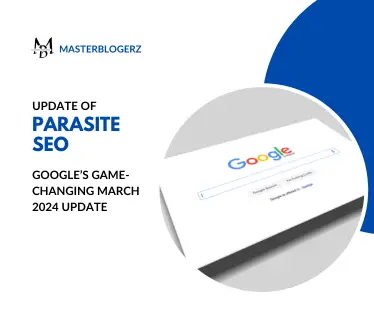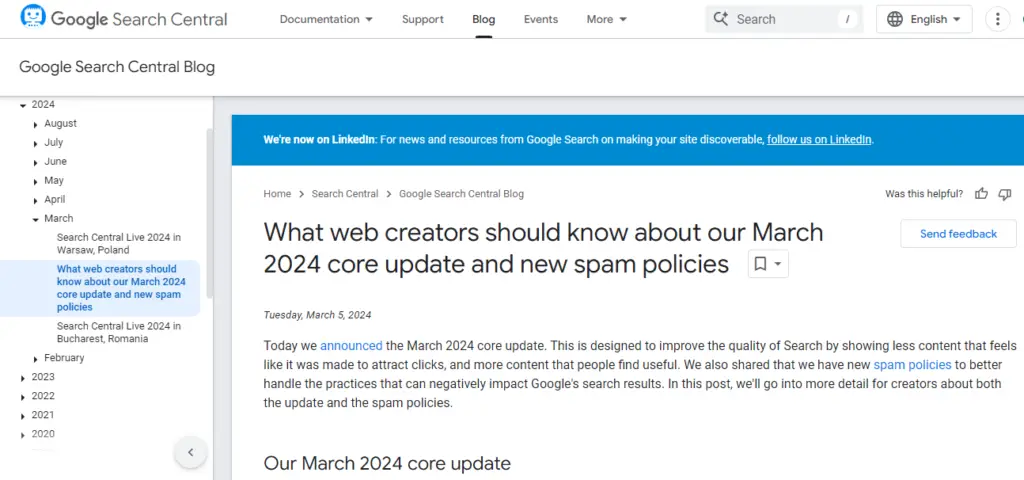
Table of Contents
Introduction
In the ever-evolving world of digital marketing, SEO strategies have to constantly adapt to changes in search engine algorithms. One such tactic, known as Parasite SEO, has been a double-edged sword for many websites. On the one hand, it offers a quick way to gain visibility; on the other, it can lead to penalties if not executed correctly. With the release of Google’s March 2024 update, aptly named the Parasite SEO Update, the landscape of this controversial SEO strategy has shifted dramatically.
The March 2024 update has introduced significant changes aimed at curbing the misuse of Parasite SEO tactics. This article delves into what Parasite SEO is, how it has evolved over time, and the impact of Google’s latest update on this strategy.
What is Parasite SEO?
Parasite SEO is a technique where marketers leverage the authority and ranking power of high-domain websites to promote their content or services. This strategy involves placing content on these high-authority sites—whether through guest posts, forums, or other means—to rank higher in search results. The “parasite” aspect comes from the content essentially riding on the back of the host site’s established authority.
How Parasite SEO Evolved
Initially, Parasite SEO was a relatively straightforward tactic, used primarily by those looking to bypass the long-term efforts required to build their own site’s authority. In the early days, it involved posting on free blogging platforms or high-traffic sites that allowed user-generated content. Over time, the method became more sophisticated, with marketers finding ways to embed links within these high-authority sites, effectively transferring some of that site’s SEO value to their own.
Current Relevance
Despite Google’s ongoing efforts to clamp down on manipulative SEO practices, Parasite SEO remains relevant, particularly in competitive niches where gaining a foothold is challenging. Some marketers continue to use this tactic, especially when they’re looking for quick visibility boosts or are working with new websites that haven’t yet built up authority.
The March 2024 Parasite SEO Update

Overview of the Update
The March 2024 update by Google has introduced a series of algorithm changes specifically targeting Parasite SEO. The update focuses on identifying and devaluing content that relies heavily on the authority of unrelated high-ranking websites. This means that content published on these sites solely for SEO purposes may no longer enjoy the ranking benefits it once did.
Why Google Introduced It
Google’s primary goal is to ensure a high-quality user experience. Parasite SEO, while effective in some cases, can lead to irrelevant or low-quality content ranking highly in search results, which undermines this goal. By introducing the Parasite SEO Update, Google aims to refine its algorithm to better distinguish between genuinely valuable content and content that is merely leveraging another site’s authority for visibility.
Immediate Impact
Since the update, many websites that relied heavily on Parasite SEO strategies have experienced a drop in rankings. This immediate impact has been felt across various industries, particularly in niches where Parasite SEO was a common practice. Websites that had built their strategy around this tactic are now reassessing their approach, as the benefits of Parasite SEO have been significantly diminished.
Understanding Parasite AI SEO
What is Parasite AI SEO?
Parasite AI SEO is a more recent evolution of the traditional Parasite SEO tactic. This strategy involves the use of AI tools to optimize content for Parasite SEO, enhancing its ability to rank by analyzing and leveraging data from high-authority websites. Unlike traditional methods, which were often manual and labor-intensive, Parasite AI SEO automates much of the process, making it faster and more precise.
AI’s Role in the Update
Google’s March 2024 update has also incorporated advanced AI to detect and combat Parasite SEO practices. This AI-driven approach allows Google to more effectively identify content that is not aligned with the host site’s purpose or quality standards. As a result, content that relies solely on the authority of another site, without adding genuine value, is more likely to be devalued.
Examples of AI-Driven Parasite SEO
Post-update, there have been examples of AI-driven Parasite SEO strategies being penalized or losing effectiveness. For instance, some sites that used AI to generate content optimized for high-ranking keywords, but hosted on unrelated sites, have seen significant drops in rankings. This indicates that Google’s AI is becoming increasingly sophisticated in distinguishing between genuine content and that which is merely SEO-driven.
Strategies for Adapting to the Parasite SEO Update
Audit Your Current SEO Practices
In light of the update, it’s crucial to audit your current SEO practices to identify any reliance on Parasite SEO tactics. This involves analyzing your backlink profile, reviewing guest posts, and assessing the quality and relevance of content hosted on third-party sites.
Focus on Quality Content
Quality content has always been the cornerstone of good SEO, and this remains true post-update. Ensuring that your content is valuable, relevant, and original is now more important than ever. Rather than relying on the authority of other sites, focus on building your own site’s authority through high-quality, user-focused content.
Leveraging AI for SEO
While the update targets AI-driven Parasite SEO, AI can still be a powerful tool for legitimate SEO practices. Use AI to enhance content creation, optimize for user intent, and improve on-page SEO elements. The key is to use AI ethically and in ways that align with Google’s emphasis on quality and relevance.
Monitor and Adjust
SEO is never a set-it-and-forget-it endeavor. Continuous monitoring of your SEO metrics is essential, particularly after a significant update like this one. Be prepared to adjust your strategies based on what the data tells you about your site’s performance post-update.
Case Studies: Winners and Losers Post-Update
Success Stories
Some businesses have successfully navigated the update by shifting their focus from Parasite SEO to building their own authority. These sites have seen stable or even improved rankings by prioritizing high-quality content and ethical SEO practices.
Failures
On the flip side, websites that continued to rely heavily on Parasite SEO post-update have faced significant ranking drops. These failures highlight the risks associated with relying on tactics that Google actively seeks to penalize.
The Future of Parasite SEO
Long-Term Effects
The long-term effects of the March 2024 update are likely to include a reduced reliance on Parasite SEO across the board. As Google continues to refine its algorithms, the effectiveness of such tactics will likely diminish further, encouraging marketers to adopt more sustainable SEO practices.
Evolving with AI
AI will continue to play a significant role in SEO, both for marketers and for Google. To stay ahead, it’s important to understand how AI influences search algorithms and to use it in ways that enhance, rather than undermine, your SEO strategy.
Conclusion
The March 2024 Parasite SEO Update has marked a significant shift in how Google approaches Parasite SEO. By focusing on quality and relevance, Google is pushing marketers to move away from manipulative tactics and towards more ethical SEO practices. As the digital landscape continues to evolve, staying informed and adaptable will be key to maintaining strong search engine rankings.
FAQs
- What is the March 2024 Parasite SEO Update?
- It’s a Google algorithm update that targets and devalues content relying heavily on the authority of unrelated high-ranking websites.
- How does Parasite AI SEO differ from traditional Parasite SEO?
- Parasite AI SEO uses AI tools to optimize content for Parasite SEO, making the process faster and more precise, while traditional methods were more manual.
- What steps should I take to adapt my SEO strategy post-update?
- Focus on quality content, audit your current SEO practices, leverage AI ethically, and continuously monitor and adjust your strategies based on performance data.

Aitizaz Rahim is a dynamic Digital Marketing and SEO expert, empowering businesses worldwide with proven strategies. As the founder of Masterblogerz, he shares actionable insights to help others master the digital marketing world.



